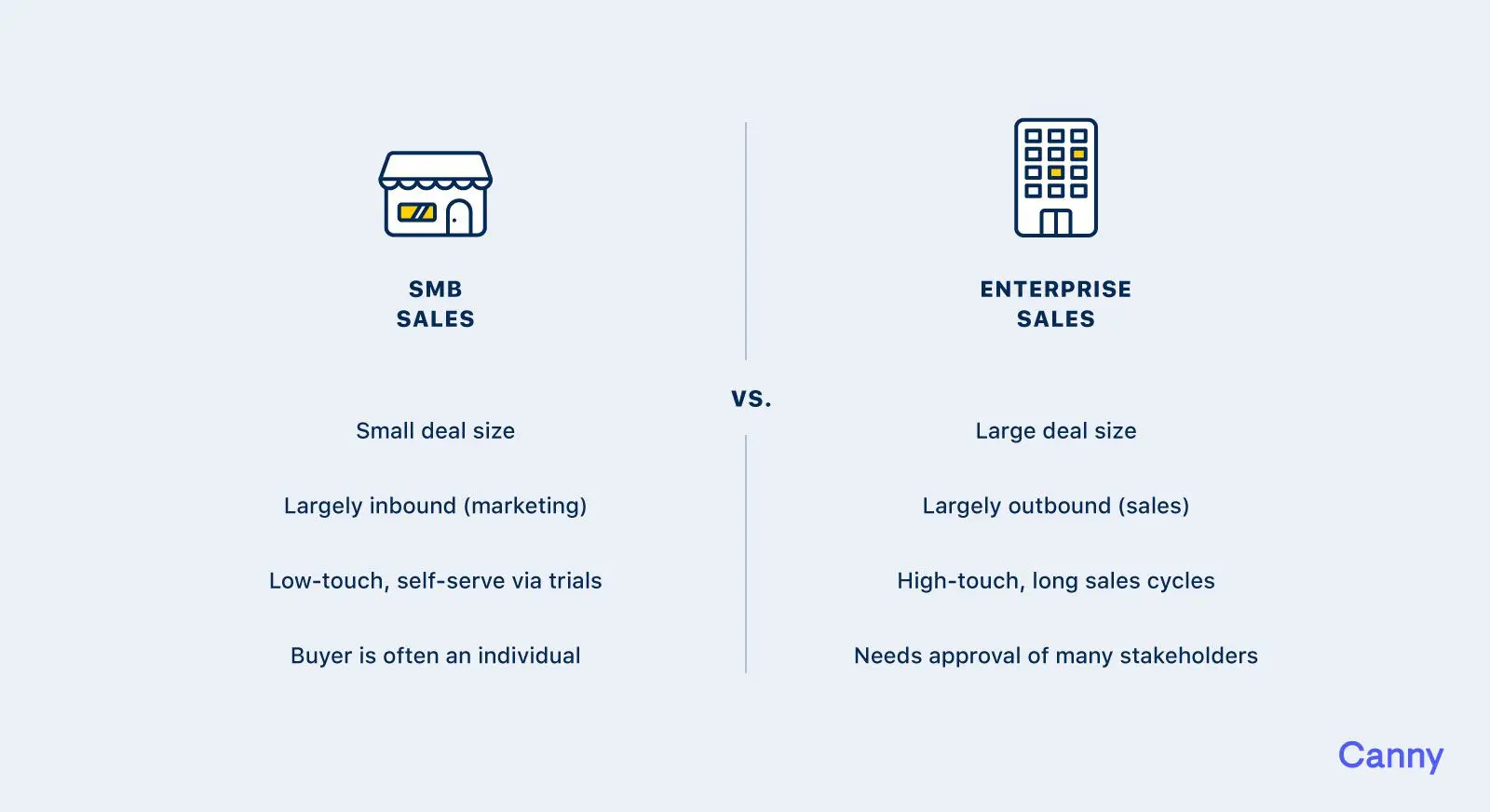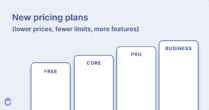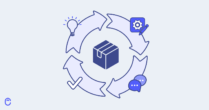Imagine this.
It’s the early days. You have under 100 customers, but things are looking pretty promising. It’s a normal day at the “office” when you hear the familiar *ding* of your Intercom live chat. It’s a lead, and they’re from Big Company X.
Your mind starts racing. We have to close this deal, no matter what. How much are they going to pay us? How much can we get them to pay us? Everyone, stop what you’re doing! This is it, we’ve made it!
Hold up.

When you’re starting up, any opportunity is exciting, especially the big ones. The chance to double your MRR? Heck yeah! It’s hard to step back and think about the implications of saying yes. If you’re a low-touch SaaS company like us, Big Company X is probably not your ideal customer.
[Startups] get a little bit of inbound interest, and they just say yes to that inbound interest without being fully aware of how you have to play the enterprise game to win.
The consequences are often more harmful than they seem. You risk wasting your time, building the wrong things, and losing yourself in the process.
Big companies have big company needs
It’s easy sniff out a big company. Their websites look it and they ask questions like:
- Can you do training sessions with our staff? (I guess so?)
- Can we set up a demo with your sales team? (What sales team?)
- Does the product have reporting? (Try our API!)
- Do you support IE? (No)
- Can you share details of your last penetration test? (Excuse me?)
These are enterprise companies, and they are high-touch compared to selling SMBs. Closing the deal involves going through a long sales process. It requires a lot of time and effort from your team. It involves navigating the company’s hierarchy to speak to the right people. We’ve heard stories of founders doing several demos only to see nobody can make the purchase.
We’ve gone down the path to selling an enterprise customer. We’ve said no to elaborate security reviews, on-premise support, and long data protection questionnaires.
If you have hundreds of people on your team, maybe you have dedicated people for every step in the process. If not, your time is probably better spent elsewhere.
Time is our most valuable resource
Of course, Big Company X often demands new features. As a product team, we naively think: We can handle this. Let’s just move things around! No big deal.
Stop right there. It is a big deal.
As startup founders, we know that at any given time, there are a million things we could work on and only so much time.

The feature requests usually fall in one of two buckets:
- They will benefit all other customers
- They will only benefit Big Company X
When features fall in bucket #1, great. It sounds like an opportunity to improve your product across the board. Still, is it the most impactful thing for you to be working on? Put your product manager hat on and see if these features are worth prioritizing. We’ve written about how you can go about feature prioritization.
When features fall in bucket #2, don’t build them. Don’t add features to your product that few people will use. This is feature bloat and it makes your product less focused, and more confusing. Building the wrong things gives your competitors an edge.
Time is a limited resource. Consider not only the time it will take to build features but also maintain them.
Don’t forget why you started your company
We started Canny for these reasons:
- We believe feedback is a problem for all software companies.
- We want to build a great, sustainable business.
- We want to have fun!
Don’t get me wrong, there are benefits in selling to enterprises. Namely, they pay more and they churn less.

Here’s why we’re not focused on selling to enterprises:
- We have limited resources. Selling to enterprise would mean not selling to a majority of businesses.
- We’d rather have many small businesses paying a small amount, than a few businesses paying a large amount. When you build your business for a few big customers, you’re left vulnerable to their demands. A diverse customer base means you can make decisions without the bias of a single company. It’s also less risky.
- Enterprise sales is not fun (for us).
Our team’s strength lies in building great products. We know we’ll be more successful (and have more fun) building a product-oriented business. Sales-oriented businesses work, they’re just not our thing. So, we decided Canny would be self-serve and focus on small to mid-sized companies.
Christoph Janz’s classic blog post highlights different approaches to building a $100m business. On his scale, we thrive in rabbit territory.

This answer might be different for you and that’s completely fine. Just know that there are fundamental differences between SMB and enterprise sales.
Tomasz Tunguz also has a great post outlining some of the differences between each path. Ask yourself if selling to enterprise is right for your product and team.
It’s also okay for that answer to change. In fact, many teams start out with SMB and move up to enterprise. It’s a solid strategy if you know what you’re getting into.
How we say no
We’ve had several big companies sign up for Canny.
We consider what it’d take to support them. We consider the features they need. In some cases, by saying yes, we’d become a consulting company. We’d be adding custom features to our product to fit the needs of a single client.
When there isn’t a good fit, we say no.
By standing by the reasons listed above, the decisions are easy. We never want to accommodate the needs of the giant at the expense of our core customer group. We want to build an awesome product that adds value to many businesses.
When you don’t know what you believe, everything becomes an argument. Everything is debatable. But when you stand for something, decisions are obvious.
We say something along these lines:
We're a small team and have to be careful with how we spend our time. These features would take up over a month of full-time work. They also wouldn't add value to our existing customers.
We understand that these features are likely deal breakers for you but let us know if you're still interested in moving forward.
Sending these responses are quite relieving. Instead of changing our plans to build something for this new customer, we can focus on bigger impact.
When to say yes
Of course, nothing in startups is a hard and fast rule. Sometimes it’s about winning that logo or case study for your homepage. Sometimes there are external pressures like investors.
For you VC-backed SaaS out there, moving upstream is a part of the playbook. You can say yes more than your bootstrapped counterparts. Still, be mindful of what it will cost you to acquire each customer.
In many cases, big companies are happy to get started with our existing offering. We’re happy to bring them on. Absolutely yes.

In some cases, they request some specific features. We make it clear what we’ll agree to build and what we won’t. The key here is setting expectations. Make it clear what you are offering, whether that’s features you already have or features you will build. We set expectations for support, pricing, and new features.
We like this approach a lot as it still leaves room for us to expand their account in the future.
Use your best judgement. Ask yourself if the potential customer is worth the effort.
The choice is yours!
Working with enterprise customers is a whole different ball game than SMBs. Luckily, as a bootstrapped startup, we can decide if we want to play. Investors usually want you to build the biggest company you can, as fast as you can. Often, startups are pressured to go upstream.
Most of today’s companies lose control early on and let outsiders dictate their direction. This works in some cases, but fails miserably in most. Outsiders simply don’t care about your mission, your product or your people as much as you do.
Right now, we’re a small, product-focused team. We’re working on building a stable, profitable business. We are proudly customer driven, but we are still the captains of this ship. Know who you are. You will be happier and your customers will be happier. Happy building!
Header photo by Sean Pollock






Sarah, I believe their demands are absolutely genuine. Even the organizations you’re serving right now may soon expect the same level of support and features, as they start growing bigger.
Hi Musadiq, thanks for your comment. Of course, their demands/requests are genuine. I’m saying that we won’t necessarily say yes.
If our current customers want more advanced features, they’re welcome to request it. However, that doesn’t mean we will accommodate. I believe a part of building a successful startup is making the right decisions.
This post is 💯. Thanks for sharing your insight and experience!
Thanks for reading Daniel! 😊
Turning down VC money takes a lot of guts. I admire what you expressed in this blog. It takes a lot of focus to stay on mission in life, in work, throughout the day! I have been poking around, exploring your site – it seems you have built something sustainable, solid, customer and team focused. A true unicorn!
Thanks so much for the kind words, Judy!